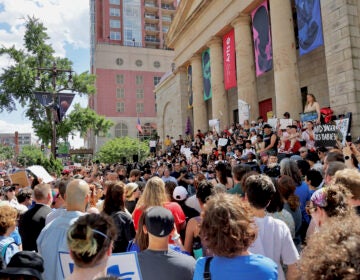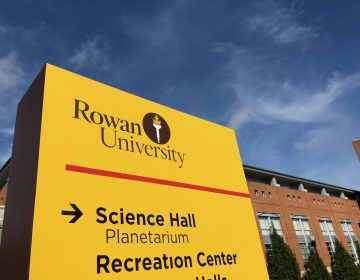After the fall: Philly arts programs search for a way out of the collapse of UArts
UArts was home to a handful of organizations with various levels of independence. After the dramatic closure, who will survive?
Listen 1:37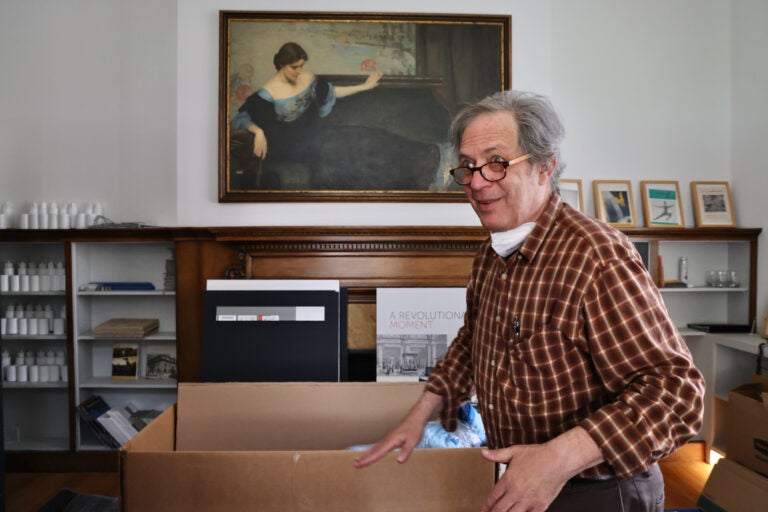
Philadelphia Art Alliance curator Sid Sachs packs up beneath a painting of Christine Wetherill Stevenson, who founded the Philadelphia Art Alliance in 1915 in her mansion in Rittenhouse Square. The organization shut down and its employees were laid off Friday along with the rest of the faculty and staff of University of the Arts. (Emma Lee/WHYY)
UArts closure: What you need to know
- Philadelphia’s University of the Arts recently announced its sudden closure
- The abrupt closure has sparked widespread criticism from students, faculty and staff, who have pushed for answers from the university
- UArts president Kerry Walk resigned shortly before the university’s last day
- The future remains unclear for UArts students, some of whom are watching the school collapse from abroad
Sid Sachs had just seven days to clear out 25 years of records and books accumulated during his career as the longtime curator of the Rosenwald-Wolf Gallery at the University of the Arts.
He admits he was never the tidiest person. He said he sometimes had to use a desk outside his office in Anderson Hall because his primary desk would be overwhelmed with piles of books and art magazines. It all had to get sorted and boxed ASAP.
“I wanted to get my personal property out of here. I just looked and I am seeing a painting that I have to take home on the wall,” he said during a phone interview from his office. “I’m devastated and demoralized and depressed. I spent 25 years here.”

Sachs reached out to the Free Library of Philadelphia and the Library Company to see if they would accept any of the books from the Albert Greenfield Library, also in Anderson Hall.
“Otherwise, it will probably be sold off as poundage. You know, this many pounds of books as opposed to real content,” Sachs said. “At one time, it was arguably the best art library in the city.”
In recent years, Sach’s job expanded to program the Philadelphia Art Alliance, the 109-year-old institution on Rittenhouse Square that UArts acquired in 2018 and spent $3 million renovating. Sachs does not believe the Art Alliance can return to being an independent organization. It will likely go down with UArts.
“They merged,” he said. “They went through Orphan’s Court, and they merged it.”
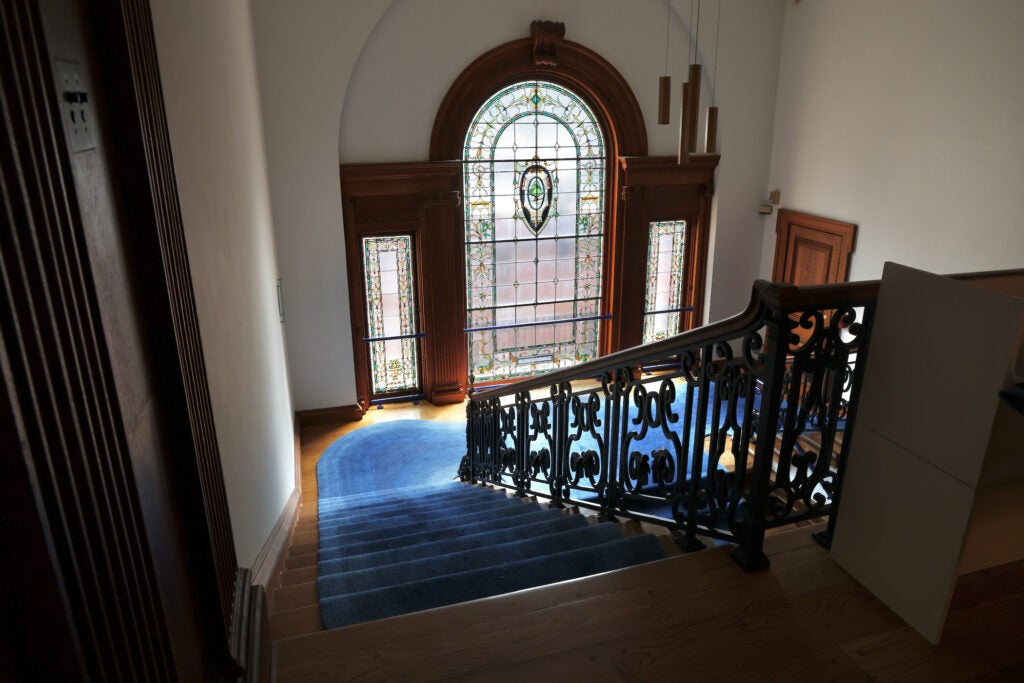
UArts was more than a place for about 1,100 students to take classes. It was home to several entities that operated somewhat independently, such as the Lightbox Film Center, the Pig Iron School for Advanced Performance Training, the Center for Immersive Media, and the Polyphone Festival of new musical theater.
While the Art Alliance will probably not continue on its own, the lights will remain on this summer. Philadelphia’s Japan Society and Collaborative Cataloging Japan have already installed an exhibition: “Community of Images: Japanese Moving Image Artists in the U.S., 1960s-1970s,” a show of mostly video art. It opens to the public this Friday.
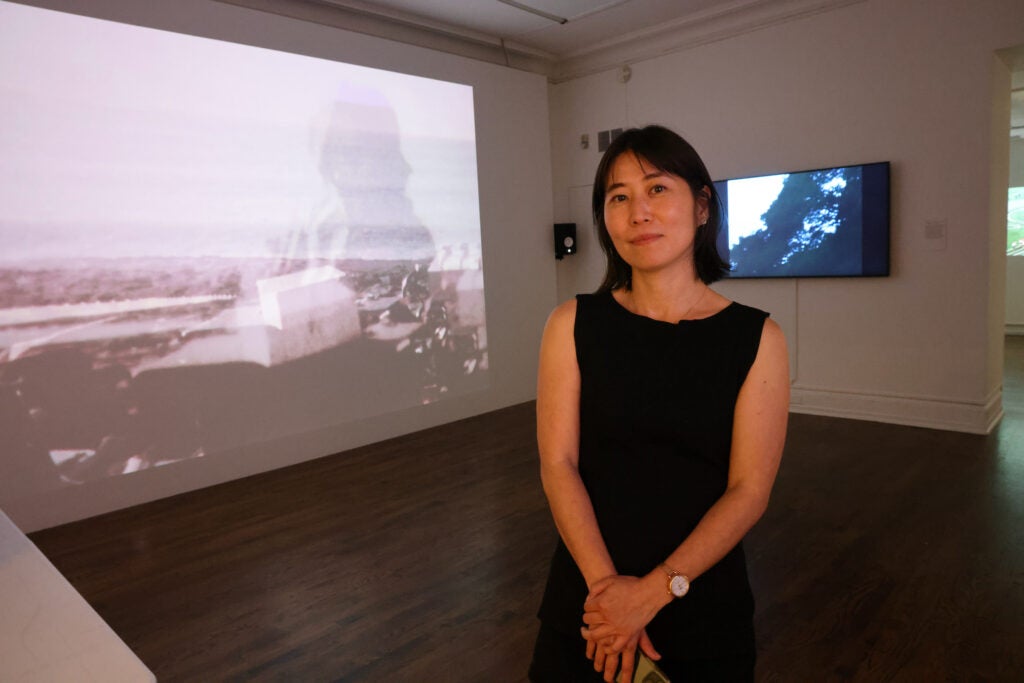
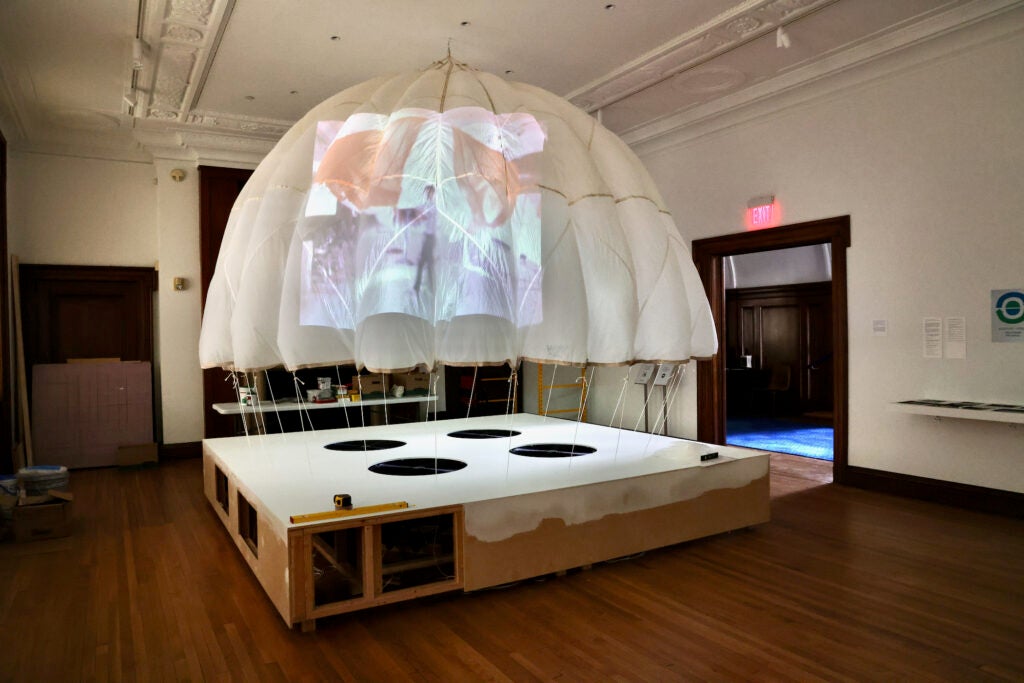
With major funding from the Pew Center for Arts and Heritage, the exhibition has been years in the planning and has already paid UArts for the use of the Art Alliance. However, much still needs to be determined about the exhibition, including how often it can be open to the public.
A temporary pop-up restaurant opening later this summer at the Art Alliance has also already leased the space.
For the Lightbox Film Center, this is the second time it has found itself without a home in five years. In 1979, Philadelphia’s only year-round presenter of art film established itself at the International House at the campus of the University of Pennsylvania. After 40 years, I-House was sold, and Lightbox found itself out on the street in 2019.
UArts took Lightbox under its wing and built a dedicated screening room in the Gershman Y building. It re-opened in 2020 as an entity of UArts.
Since then, director and curator Jesse Pires has expanded into film preservation, conserving and re-releasing largely forgotten films in partnership with UCLA.
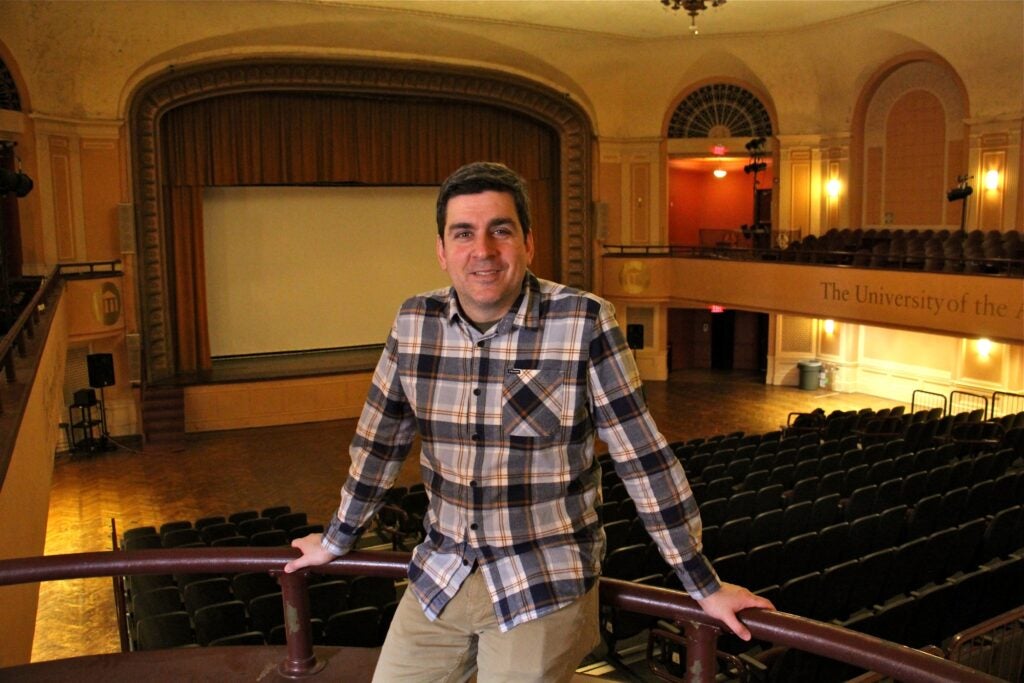
Without UArts, Pires is again without a job and facing an uncertain future.
“It’s unclear what happens next in terms of Lightbox,” he said. “I’ve worked above and beyond for Lightbox for 20 years now. I certainly don’t want to abandon it or see it disappear.”
Pires said Lightbox will go on an extended hiatus while he looks for a new institutional partner. He does not believe Lightbox can exist on its own.
“It really needs to be somewhere,” he said. “It was a good fit here [at UArts]. It was part of a great arts community, so it made sense. Hopefully, there’s something else out that also makes sense.”
Lightbox is not completely disappearing this summer. One of the most recent films it helped restore, “Naked Acts” (1996) by Bridget M. Davis, will be screened at the Brooklyn Art Museum this weekend. Later this month, the Lightbox-restored film “The Innerview” (1973) by Richard Beymer, will be screened at Il Cinema Ritrovato, a festival of classic and restored films in Bologna, Italy.
One of Philadelphia’s most prominent avant-garde theater companies, Pig Iron, became part of UArts in 2015. In addition to creating original theater works, in 2011 Pig Iron had started teaching students its devised theater methods as the Advance Performance Training School, a state-sanctioned certificate program.
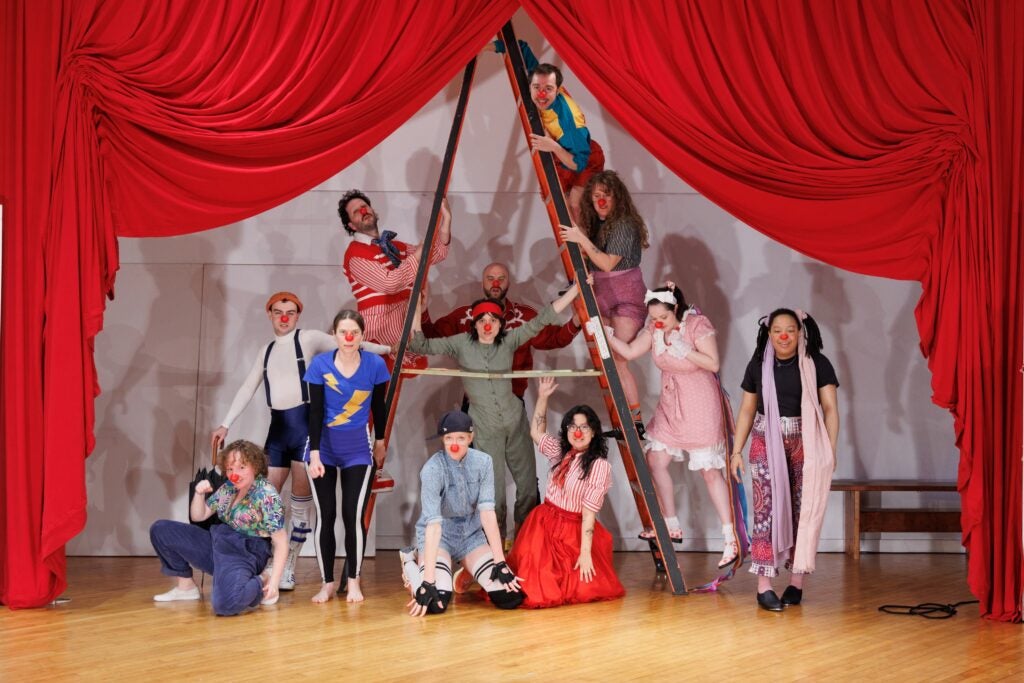
In 2015, Pig Iron partnered with UArts to make the school a degree program: students could study theater at Pig Iron’s school in Kensington, take additional classes downtown at UArts, and earn a Master of Fine Arts.
“We took advantage of many of the things that happened at UArts,” said Pig Iron co-founder Quinn Bauriedel. “Students could take music classes; they could take visual art classes. They had a home within Pig Iron in our beautifully made core curriculum, but they were also part of this larger arts scene and arts institution.”
The UArts partnership involved quarterly payments to reimburse Pig Iron for the cost of instructing students in its space, a former Catholic school in Kensington. It has not been paid for the last two quarters, or about $300,000.
“That is money we already spent,” said Bauriedel.
“We had things we were working on for September, and then the news broke, and it was like a gut punch,” he said. “An unmooring of things that we held onto as anchors of stability that were suddenly ripped away.”
Pig Iron might be able to continue without UArts. Bauriedel said the Advance Training could once again become an independently operated certificate program. Its graduates would not have the career advantages of MFA, but their theater training will be the same.
Pig Iron has already accepted students for the fall, but the sudden collapse of UArts makes that term uncertain. Bauriedel said the program will likely pause until January 2025 and is seeking donations toward a bridge fund.
In the meantime, Pig Iron is looking for another place to build a degree program.
“Is there another institutional partner that would feel like the right people, the right fit, and the right culture that this whole thing can work?” he asked. “Nothing is quick, and we will not be taking a break while working through this thing, that’s for sure.”

Get daily updates from WHYY News!
WHYY is your source for fact-based, in-depth journalism and information. As a nonprofit organization, we rely on financial support from readers like you. Please give today.



